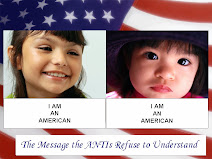 It was a neighborhood basketball game. A team of Latino boys were playing basketball against a group of non-minority neighborhoods boys. The reaction was immediate and rooted in the state's new law on illegal immigration. One mother, witness to the incident said, "They told them, `You shouldn't be winning. You should go back to Mexico." Latino children are facing more bullying and taunts at school since Alabama's tough crackdown on illegal immigration took effect last month. Many blame the name-calling on fallout from the law, which has been widely covered in the news, discussed in some classrooms and debated around dinner tables.
It was a neighborhood basketball game. A team of Latino boys were playing basketball against a group of non-minority neighborhoods boys. The reaction was immediate and rooted in the state's new law on illegal immigration. One mother, witness to the incident said, "They told them, `You shouldn't be winning. You should go back to Mexico." Latino children are facing more bullying and taunts at school since Alabama's tough crackdown on illegal immigration took effect last month. Many blame the name-calling on fallout from the law, which has been widely covered in the news, discussed in some classrooms and debated around dinner tables.The Department of Justice is monitoring bullying incidents linked to Alabama's law.
"We're hearing a number of reports about increases in bullying that we're studying," the head of the agency's civil rights division, Thomas Perez, said during a stop in Birmingham. The Justice Department has established a bilingual telephone hotline and special email account for residents to report any violence or threats based on racial or ethnic background that are linked to the law. Federal officials say some parents -- particularly Latinos -- may not report bullying to teachers and principals because they fear coming into contact with government officials.
Supporters of the law claim it is vital to reducing the cost of state and local government by getting illegal immigrants off public assistance, though they have no facts to prove their allegations. They also argue the measure will create jobs for legal residents by opening up positions that had been held by people living in the country illegally. However, Americans have shown little to no interest in the backbreaking, low-paying jobs at farms and poultry factories that are held by many of the Latinos they are targeting with the law.
Those that oppose this racial profiling law say the law is creating a climate of fear and mistrust in the state that's unsettling for all Latinos -- citizens and immigrants. Immigrants tell of dirty looks in grocery stores, and online forums are full of angry, anonymous comments from both supporters and opponents of the law.
Machine shop manager Hector Conde said his family has seen the problem firsthand. He Latino and his family are citizens. Conde, whose family lives in Autauga County north of Montgomery, was appalled when his 12-year-old daughter, Monica Torres, told him a schoolmate called her a "damn Mexican" during a school bus ride. "She is a citizen. She doesn't even speak Spanish," said Conde, a U.S. citizen originally from Puerto Rico. "The culture being created (by the law) is that this sort of thing is OK."
A Hispanic woman said her 13-year-old niece was called a "stupid Mexican" and told to "go back to Mexico" by a classmate in Walker County. "She said, `If you're not going I'm going to punch you."'
Courts have struck down sections of the law, including a provision that required public schools to verify the citizenship status of students. Other sections remain in effect, including a part that lets police check a person's immigration status during a traffic stop. Courts also can't enforce contracts involving illegal immigrants, such as leases, and it's still a felony for an illegal immigrant to do business with the state for basic things like getting a driver's license.
U.S. Attorney Joyce Vance, the lead federal prosecutor for north Alabama, said many Hispanic parents may be afraid to report bullying for fear of coming in contact with government officials. Under the law, authorities are supposed to detain suspected illegal immigrants found living in the state and hold them for federal immigration authorities. Parents may be afraid to even go to school teachers and principals, she said. "It seems likely to me that people are trying to keep their heads down and stay out of trouble," said Vance.
Charles Warren is school superintendent DeKalb County, where about 18 percent of the 8,900 students enrolled in public schools are Hispanic. He doesn't see much tension between Hispanic students and others -- Crossville High School has had a Hispanic homecoming queen the last two years, he said. "The kids get along great, it's the adults who are the problem," Warren said. "There are a lot of similarities to what went on back in the `50s and `60s with the civil rights movement. A lot of people are out of work now and they want to blame someone. I think the Hispanic people are catching a lot of that."







